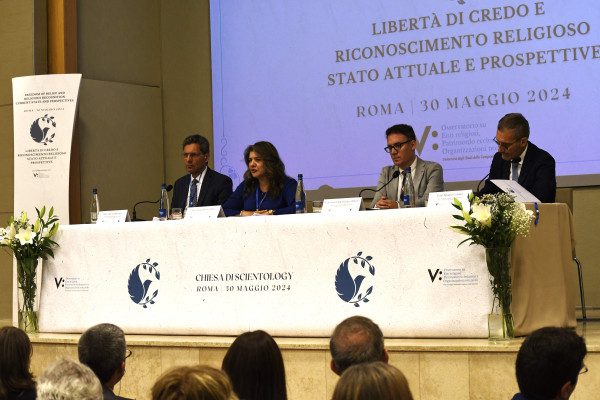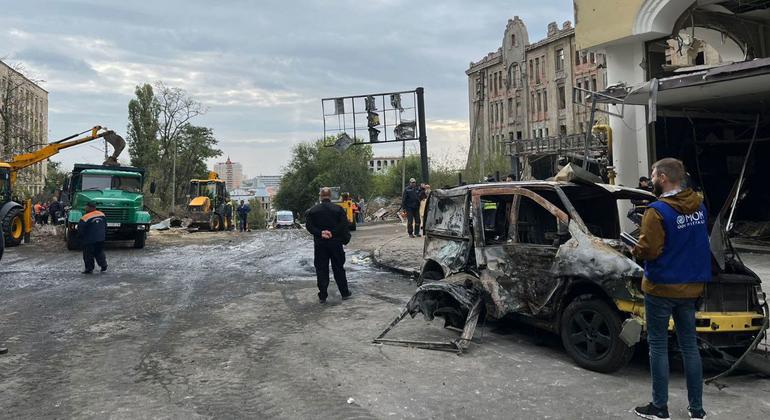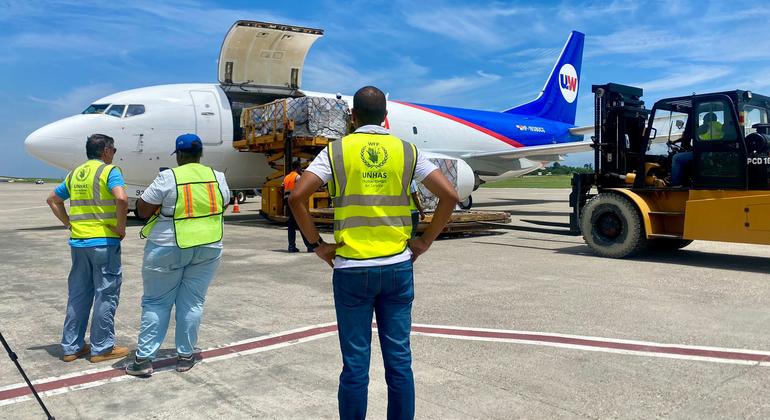University professors, government officials, parliamentarians and religious representatives participated in a day-long conference where they discussed the current challenges to religious freedom.
KingNewsWire // Brussels, Brussels, Belgium, 3rd Jun 2024 – On Thursday, May 30th, the international conference on freedom of religion in Italy and the world, titled “Freedom of Belief and Religious Recognition: Current State and Perspectives,” was held in the auditorium of the Church of Scientology in Rome. It was organized with the collaboration of the Observatory on Religious Entities, Ecclesiastical Heritage, and Non-Profit Organizations of the University of Campania “Luigi Vanvitelli.”
The conference consisted of two international roundtables in the morning moderated by Prof. Alfonso Celotto, professor of constitutional law at the University of Roma Tre, and two national ones moderated by Prof. Antonio Fuccillo, professor of ecclesiastical and intercultural law at the University of Campania “Luigi Vanvitelli.”
International examples of religious freedom
The first panel had as speakers Senator Lorena Rios Cuéllar, former director of religious affairs of the Colombian government; Prof. José Daniel Pelayo Olmedo, deputy director general for the coordination and promotion of religious freedom of the Spanish government; and Dr. Gary Vachicouras, Orthodox Christian theologian (Chambésy, Geneva).
This panel outlined the situation in Colombia, a secular but not atheist state with a constitution that guarantees freedom of religion both individually and collectively. It then covered that of Spain, where there are 26,000 religious groups registered in the Register of Religious Bodies. For the Greek-born Prof. Vachicouras, societies are increasingly facing religious plurality and the resulting problems. The solution to conflicts, he stated, is acceptance of the principle of freedom of belief. The panel showed how three countries with different traditions (Colombia, Spain, and Greece) have recognized their religious entities, including Scientology, within a framework of great freedom and inclusion.
The second panel included U.S. attorney and constitutional expert Austin Hepworth; Prof. Juan Ferreiro Galguera, professor of church law at the University of Oviedo, Spain; and Prof. Vincent Berger, former jurisconsult at the European Court of Human Rights.
Attorney Hepworth explained how the principle of religious freedom is applied in the U.S., also recalling the 1948 U.S.-Italy Friendship Treaty on automatic mutual recognition of entities, including religious ones. Prof. Ferreiro Galguera explained the difference between the secular state that respects religious phenomena and the cooperation with it as it happens in Spain, and the secularist state that instead prevents it, as it happens in France.
Prof. Berger asserted that the state’s tolerance of a religious denomination should not replace its full recognition, and he recalled the remedies offered by the ECHR on limitations of religious freedom, with the possibility of recourse to the Strasbourg Court as well.
Italian situation of religious freedom under analysis
The speakers at the first section of this panel were Prof. Maria D’Arienzo, professor of ecclesiastical, canonical, and confessional law at the University “Federico II” of Naples; Prof. Gianfranco Macrì, professor of intercultural law at the University of Salerno; and Prof. Francesco Sorvillo, associate professor of Law and Religions at the University of Campania “Luigi Vanvitelli.”
The peculiarity of the Italian normative situation emerged, in that the Constitution addresses religious freedom in 4 specific articles and in 5 with a more general approach, yet it still lacks a law on religious denominations, still having to refer to Law No. 1159, which dates back to 1929, and which concerns “admitted denominations” in the “Kingdom of Italy”, a law that predates the republican democracy that is Italy today.
The second section of this panel featured the editor-in-chief of “bitterwinter.org” and journalist for the “Journal of CESNUR,” Dr. Marco Respinti; Dr. Nader Akkad, religious affairs advisor of the Grand Mosque of Rome; and Mother Anastasia, legal advisor of the Romanian Orthodox Diocese.
Dr. Respinti explained how the media perceive religiosity and their own responsibility on how it is perceived in society. Dr. Akkad emphasized the importance of dialogue between members of different faiths, while Mother Anastasia spoke about the difficulty of the Romanian Orthodox Church working on recognition in Italy for over 13 years.
What emerged overall was the need for greater attention to the religious phenomenon for accomplished regulation not only at the level of individuals but also of organizations in their relations with states.
“Freedom of religion and respect for the beliefs of others have always been principles of fundamental importance to the Church of Scientology,” recalled Lina Pirotta, representative of the Church of Scientology Italy, in her welcome address to the conference participants.
The Creed of the Church of Scientology itself, written in 1954 by the religion’s founder, L. Ron Hubbard, among other points states, “We of the Church believe that all men have inalienable rights to their own religious practices and their performance.”
It is within this framework that the Church of Scientology has strongly supported this conference, collaborating with domestic and foreign experts to make it happen in order to provide a clearer picture of the state of freedom of belief in Italy and other countries, and the possible solutions that could help make, of this fundamental right, a fulfilled reality, favoring its development.














